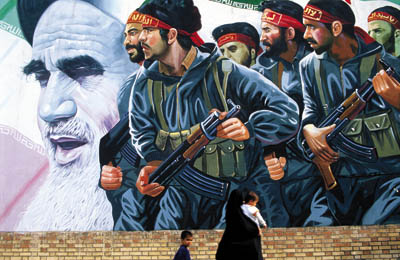|
|
|
An Iranian Revolutionary Guards Corps poster. Photo from Trends Magazine. |
The war of words between the US military and Iran over Iran’s involvement in terrorist activity in Iraq heated up on Sunday after General David Petraeus, the commander of Multinational Forces Iraq, said the Iranian ambassador was an Iranian intelligence agent.
“The ambassador is a Qods force member,” Petraeus told a group of reporters near the Iranian border in Diyala province. Ambassador Hassan Kazemi-Qomi’s rank in Qods Force was not disclosed. Qods Force is the covert foreign wing of the Iranian Revolutionary Guards Corps, which has set up and supported terrorist groups such as Lebanese Hezbollah, Hamas, and several terrorist entities in northern and eastern Africa.
While many nations have and continue to use diplomatic cover for intelligence activities, Iran has appointed an intelligence officer to the most senior diplomatic position in Iraq. “Now he has diplomatic immunity and therefore he is obviously not subject (to arrest),” Petraeus said. “He is acting as a diplomat.”
Iran has repeatedly used diplomatic covers for its intelligence agents sent into Iraq. Iran maintains that Mahmud Farhadi, a senior Qods Force officer captured in Sulimaniyah on September 20, was a deputy governor on a diplomatic trade mission to the Kurdish Regional Government. The US military has positively identified Farhadi as the commander of the Zafr Command, one of three units subordinate to the Ramazan Corps, the Qods Force operational command for Iraq.
In January 2007, US forces captured five Qods Force officers in Irbil. The Iranian government still maintains the men were consular officials. The “Irbil Five” are currently in US custody.
While Petraeus did not disclose the intelligence used to identify Ambassador Qomi as a Qods Force agent, a combination of signals and human intelligence are the likely sources of information on his activities. US intelligence is closely shadowing Qomi’s activities in Iraq. In addition to Farhadi and the Irbil Five, the US has captured numerous Iranian supported operatives inside Iraq.
In March 2007, Coalition forces captured Qais Qazali, his brother Laith Qazali, and several other members of the Qazali network, an Iranian-backed terrorist group. Qazali was a spokesperson and senior aide to Muqtada al Sadr. In July, US forces captured Azhar al Dulaimi, the tactical commander behind the Karbala Provincial Joint Communications Center attack that resulted in the kidnapping and murder of five US soldiers. The Qazali network organized this attack, which was ordered and directed by Iran. In early September 2007, Multinational Forces Iraq announced the capture of “a highly-sought individual suspected of being an Iranian Revolutionary Guards Corps-Qods Force” operative in Karbala.
The most significant capture occurred in the spring of 2007, when the US detained Mussa Ali Daqduq. Daqduq is a senior Hezbollah operative who was tasked by Iran to organize the Special Groups and “rogue” Mahdi Army cells along the lines of Lebanese Hezbollah. Documents seized during Daqduq’s capture, along with statements made during interrogations and information given by other captured Special Groups operatives confirmed Iran’s significant role in the Shia terrorist insurgency. Daqduq met with senior Qods Force officers inside Iran.
Petraeus also touched on Iranian involvement in arming, training, funding, and commanding the Shia insurgency in Iraq. “[The Iranian government is] responsible for providing the weapons, the training, the funding and in some cases the direction for operations that have indeed killed U.S. soldiers,” Petraeus said. “There is no question about the connection between Iran and these components [the Special Groups], attacks that have killed our soldiers.”
Multinational Forces Iraq designated the Iranian-backed terror organizations such as the Sheibani and Qazali Networks, the “rogue” Mahdi Army, and others as the “Special Groups” and began aggressively targeting these terror groups in mid-spring. Most recently, US forces killed 25 Special Groups fighters in Diyala province and captured 15 in Baghdad. Three Special Groups operatives were captured today during a raid in Sadr City.
 Please support The Long War Journal by donating to Public Multimedia Inc., our nonprofit media organization and publisher of The Long War Journal. All donations are 100 percent tax-deductible, and all donations will be used to support The Long War Journal.
Please support The Long War Journal by donating to Public Multimedia Inc., our nonprofit media organization and publisher of The Long War Journal. All donations are 100 percent tax-deductible, and all donations will be used to support The Long War Journal.









2 Comments
Bill: The Irbil raid was Jan. 2007, not 2006. Feel free to delete after correcting. Regards.
Trackbacked by The Thunder Run – Web Reconnaissance for 10/09/2007
A short recon of what’s out there that might draw your attention, updated throughout the day…so check back often.